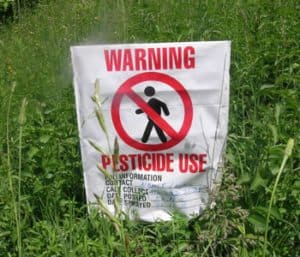Pesticides and food safety has become a hot topic in most developed countries and increasingly around the world. The amount of pesticides in today’s produce is a clear notion that our food safety is compromised. Pesticides nowadays are the omnipresent monster that is inherent to nearly every fruit and vegetable that reaches our table.
Have you ever wondered what pesticides do to your body and how food safety is most likely one of the most central concerns in today’s world?
What are Pesticides
The term pesticides refers to a broad class of crop-protection substances:
- insecticides, for insect control
- rodenticides, for rodent control
- herbicides, for weed control
- fungicides, for fungi
- mold and mildew control
Chemical herbicides have the widest use in agriculture. In a nutshell, they are a nuclear bomb of chemicals that corrupts food safety.
Chemical herbicides have the widest use in agriculture, and are nuclear bomb of chemicals that corrupts food safety.Click To TweetModern production of food incorporates a wide range of synthetic chemicals. Many of these chemicals have the potential to be very damaging to humans if they are exposed to high concentrations, or to low concentrations over an extended period of time.
Even though more and more people are realizing there is a vast spectrum of pesticides in conventionally produced food, what could they really do? It is an ill-hidden fact that most of the studies on food safety are done or supported by the companies themselves. The result – a myriad of illnesses for both humans and the environment.
How often do you think of pesticides and food safety really? Imagine munching on a beautiful big green apple. You are probably thinking you are giving your body some great nutrition it needs. Yet, do you know that you are eating an invisible coating which you may not even want to eat? Have a look:
Farmers use pesticides on many conventionally grown fruits and vegetables. The EPA sets limits on how much pesticide residue can remain on food. But are these correct?
Pesticides and Food Safety – Tolerance Levels
It is a relatively complex process, incorporating variables such as the toxicity of the pesticide and how much of the food people generally eat. At the end, each of the 9,700 pesticides (at count in 1996) receives a number called a “tolerance.”
The EPA, FDA, and USDA claim they play a role in ensuring pesticides on our food do not exceed the tolerances – at least, one would hope so.
No one could possibly test all the food grown or imported in the Western markets. Even 1% of the total produce in the West is a huge amount.
Also, although pesticide tolerances should in theory be safe, these chemicals are by their very nature toxic. Direct studies on people do not exist either.
Although #pesticide tolerances should in theory be safe, these chemicals are by their very nature toxic. Click To TweetMore importantly yet, the individual food safety profiles of pesticides do not take into consideration any hazard from their combined effects. Take a Cheerio’s box off the shelf, and you can find residues from more than 30 pesticides. Each one is within its tolerance, but how about the effect of those chemicals acting in combination in our systems?
Build Ups in the Body
Combined pesticides build up in the body after many years of pesticide exposure, another reason why they are particularly dangerous for pregnant women and kids. Ingestion or pesticide exposure can cause:
- Problems with motor skills
- Behavioral issues and disorders
- Delayed developmental growth
According to FDA data analyzed by the non-profit Environmental Working Group, the following fruits and vegetables tend to contain the highest levels of pesticide residue:
- Peaches, Apples, Sweet bell peppers, Celery, Nectarines, Strawberries, Cherries, Pears, Imported grapes, Spinach, Lettuce, Potatoes
As you can see, these are the thin-skinned fruits and vegetables.
The foods with the least pesticide residues were:
- Avocados, Onions, Frozen sweet corn, Pineapples, Mangoes, Asparagus, Sweet peas, Bananas, Cabbage, Broccoli, Papayas, Kiwi, Eggplant, Cantaloupe, Watermelon, Sweet Potato, Melon
Consequently, you can improve food safety and reduce your exposure to pesticides by buying organic for the high-pesticide items. Furthermore, according to EWG, conventionally grown produce should be fine for those on the low-residue list.
How to Reduce Contamination
Pesticides and food safety are a topic you should consider at each meal. You can take steps to reduce pesticide contamination of fresh food.
- First, eating organic fruits and vegetables from your local farmers market is usually a plus.
- Second, rinsing reduces but does not eliminate pesticides. Peeling helps, but valuable nutrients often go down the drain with the skin.
- Finally, the best approach: eat a varied diet and rinse all produce thoroughly as a quick rinse will not do.
Pesticides do mean compromise on food safety but you can work to limit it for you and your family.
Credit: Excerpts from “Safer Food for a Healthier You“, WebMD
Check out our articles on Fair Trade Food, Right, Organic Food or Local, or?, Genetically Modified Salmon, Control the World through genetically Modified Food, What are GMOs

